You can learn a thing or two from this malodorous Monty Python skit, Argument Clinic:
Showing posts with label tutorials. Show all posts
Showing posts with label tutorials. Show all posts
March 2, 2011
February 25, 2011
New Premiere training from Eran Stern
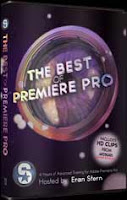 Eran Stern has launched a new product, The Best of Premiere Pro, with more than 4 hours of training for Adobe Premiere Pro and Production Premium. The package covers various features for intermediate users and ambitious beginners, with dozens of tips and tricks to tame a number of Premiere's quirks.
Eran Stern has launched a new product, The Best of Premiere Pro, with more than 4 hours of training for Adobe Premiere Pro and Production Premium. The package covers various features for intermediate users and ambitious beginners, with dozens of tips and tricks to tame a number of Premiere's quirks.Eran covers multicam and some editing, graphic design, titles, audio mixing, and transitions and effects. Over a third of the training deals with a single project using a Dynamic Link workflow with other software in Production Premium -- Photoshop, After Effects, Soundbooth, and Encore to create a Blu-ray HD DVD and interactive content. Eran's an old hand at After Effects, so his coverage is effects-oriented but really aiming to stay inside Premiere for fast render and playback, and only going to AE when really needed.
The focus on gotchas is not the usual stuff you see repeatedly in free tutorials, though instead of a section on 3rd-party filters (see AE's CycoreFX inside Premiere Pro CS5), I would have rather seen approaches on media management and avoiding reconforming (the "worst" of Premiere).
The package is inexpensive and includes 2 free HD clips, courtesy of Artbeats. There's sample tutorials on Eran's blog, like Transparent Video in Premiere. Here's the intro:
January 16, 2011
Cinema 4D Dynamics + Depth of Field

The influence of Cinema 4D in motion graphics continued to grow in 2010, and not just in making shiny balls. It's enough to spark interest in someone burned out on 3D from time in the Electric Image world.
Some Cinema 4D training resources were mentioned awhile back on AE Portal, and an attractive library of training is available from Tim Clapham. Tim's training can be found at Fxphd, Motionworks, and now HelloLuxx, where he recently released Cinema4D Dynamics Training.
News on the intersect between 3D and Affects Effects and compositing is often covered by Lester Banks, but there's a few new resources on Cinema 4D depth of field. As Quba Michalski notes, "Cinema 4D has a rather counter-intuitive method of producing depth of field. Both the camera controls and the way in which C4D handles depth maps can be a cause of major headache, especially for the newcomers to this program."
Some Cinema 4D training resources were mentioned awhile back on AE Portal, and an attractive library of training is available from Tim Clapham. Tim's training can be found at Fxphd, Motionworks, and now HelloLuxx, where he recently released Cinema4D Dynamics Training.
News on the intersect between 3D and Affects Effects and compositing is often covered by Lester Banks, but there's a few new resources on Cinema 4D depth of field. As Quba Michalski notes, "Cinema 4D has a rather counter-intuitive method of producing depth of field. Both the camera controls and the way in which C4D handles depth maps can be a cause of major headache, especially for the newcomers to this program."
John Dickinson has created a new Cinema 4D DOF Quick Reference Guide, which "shows a top view of an actual Cinema 4D camera with extra visuals to help explain what the numbers in the Camera Depth Of Field dialog box are actually doing."
To simplify set-ups Quba has posted Cinema 4D Depth of Field Camera Rig, a 46-minute tutorial and preset, which also aims to help with "exporting both the 3D camera data and depth maps to After Effects (and potentially other compositing packages)." [Update: there's already an upgrade to Quba's C4D rig; see iDoF Camera Rig: Community Update 1.1.]
Here's the preview video, which seems similar to what Andrew Kramer showed using just Affects Effects in a tutorial that came with Optical Flares:
December 29, 2010
Subclips in Premiere: What? Why? How?
 Andrew Devis posted a new video tutorial on sunclips in Premiere, Subclips: What? Why? How?:
Andrew Devis posted a new video tutorial on sunclips in Premiere, Subclips: What? Why? How?:"Subclips are essential when you need to organise a long piece of footage into smaller, more manageable chunks so that you can keep track of your project... Andrew Devis explains what subclips are, why you may want to use them and how to create and edit them."
For more see Using Subclips in Premiere Pro by Franklin Mcmahon at Layers and Creating and playing clips in Premiere Help.
Devis also has a tutorial for new editors on a relatively new (CS4) feature in Premiere, Understanding Nesting: A Key to Efficient Editing. Nesting of course is one of the earliest features of After Effects (early on it was called "Compify").
November 11, 2010
Premiere for switchers

Adobe has a big push to attract new users and switchers away Apple. It seems that Adobe has a window until a probable late 2011 update to ProApps (various references), with Steve Jobs messages (calling the next versions "awesome" then apparently downgraded to "great") working on user nerves. But rumors work both ways, with scenarios of Microsoft buying Adobe and Avid, and early switchers taking a longer view and switching back to Final Cut [update: Todd Kopriva noted that this article was based on experience with CS4, though workflow issues might remain even with better XML in CS5].
To lure users, Adobe has posted a video series on Switching to Premiere Pro CS5 with Karl Soule and Kevin Monahan. Monahan, who with Sharon Franklin and others started the first FCP user group (SF Cutters) in 2000 and had been in quality assurance various times at Apple, now has steady work promoting Premiere as Todd Kopriva's replacement on the Adobe Learning Resources team. And as Kevin notes on his blog, there's a 4-Part Premiere Pro & Switcher Series Coming Next Week!
Here's a sample from the Adobe TV Switcher series from Soule and Monahan, on keyboard shortcuts in Premiere and how to customize the keyboard to make it more familiar for Final Cut Pro users:
Update: here's a nice demo via Karl Soule (he's using Windows, which may explain his amazement about people still using Final Cut),
To lure users, Adobe has posted a video series on Switching to Premiere Pro CS5 with Karl Soule and Kevin Monahan. Monahan, who with Sharon Franklin and others started the first FCP user group (SF Cutters) in 2000 and had been in quality assurance various times at Apple, now has steady work promoting Premiere as Todd Kopriva's replacement on the Adobe Learning Resources team. And as Kevin notes on his blog, there's a 4-Part Premiere Pro & Switcher Series Coming Next Week!
[Update: PVC has a roundup of the recordings in Switching to Adobe Premiere Pro-A 4-part switcher series.]
Update: here's a nice demo via Karl Soule (he's using Windows, which may explain his amazement about people still using Final Cut),
CS5: Cutting off the Card from Clint Milby on Vimeo.
Update 2: the video above ended up in an article on PVC. Though the title's Premiere = "salvation" is over-the-top, Karl Soule added these comments,
"There still are some effects that require rendering, and Clint uses some of these effects in his video. However, the following effects DON’T require any rendering in a properly configured system:Positioning
Scaling
Opacity
Blending Modes (including 25 blending modes from Photoshop)
Fast Color Corrector
Three-Way Color Corrector
RGB Color Corrector
RGB Curves
Gaussian Blur
Sharpen
Color Balance
Gamma Correction
Ultra Key (Chroma Keying)
multiple Garbage Matte Effects
Track Matte
Noise
Basic 3D
Drop Shadow
Crop
Edge Feather
Dissolves
Dip to color effects
Levels
Scaling
Opacity
Blending Modes (including 25 blending modes from Photoshop)
Fast Color Corrector
Three-Way Color Corrector
RGB Color Corrector
RGB Curves
Gaussian Blur
Sharpen
Color Balance
Gamma Correction
Ultra Key (Chroma Keying)
multiple Garbage Matte Effects
Track Matte
Noise
Basic 3D
Drop Shadow
Crop
Edge Feather
Dissolves
Dip to color effects
Levels
This isn’t a full list, but should give you some idea of the effects that are real-time, and don’t require rendering.Now, what is a “properly configured system”? It just means that the system has a recommended graphics card, like a $300 GTX 470 card. These effects are all GPU-accelerated, and won’t give the “red bar” on the timeline."
Update 3: maybe someday a Premiere fan will get a rebuttal from an Avid user, like the posts by FCP fans; see Dylan Reeve on What IS the big deal about FCP?
Tutorial series on Project panel in Premiere
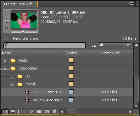
Andrew Devis has 2 videos posted from a new series of tutorials on the Project panel in Premiere. Project Panel: Organizing, Automating and Searching and Project Panel: New Items & Templates show how to organize footage items, automating them to a sequence, the search options available, types of assets, some seemingly hidden templates. [update: the series continues, Project Panel: Preferences & Bin Structures, Project Panel: Importing Footage, etc.]
For additional info, see Customizing the Project panel and Organizing assets in the Project panel in Premiere Help, and the Learn Premiere Pro CS5 series on Adobe TV.
June 2, 2010
Realistic Muzzle Flare Tutorial
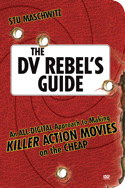 This post has been updated and moved to ProVideo Coalition as Muzzle flashes in After Effects.
This post has been updated and moved to ProVideo Coalition as Muzzle flashes in After Effects.
July 29, 2009
How to shoot for planar tracking & place tracking markers
Via AETuts, Hollywood Camera Work has posted 4 sample tutorials and (maybe) free green screen and tracking plates from Visual Effects for Directors, which was just reviewed by Mark Christiansen on PVC. Tutorials include How to place tracking markers and How to shoot for planar tracking. Here's the preview via Filmaking Central:
 Also, Eric Alba posted pictures of his vfx tracking markers, including a free PDF template.
Also, Eric Alba posted pictures of his vfx tracking markers, including a free PDF template.
March 15, 2009
Photoshop adbusting on Berlin billboards
via Motiongraphr weblog, via Gizmodo, via Notcot.org, etc...
Photoshop adbusting on Berlin billboards
September 27, 2008
CS4 Learning Centers at Layers & Photoshop User
 Layers Magazine has a CS4 Learning Center with video reviews and tips for most of the CS4 applications, including After Effects.
Layers Magazine has a CS4 Learning Center with video reviews and tips for most of the CS4 applications, including After Effects.Also, Photoshop User has more specific video at its Photoshop CS4 Learning Center. In particular, check out the less flashy new features like the Adjustment Panel, Dodge & Burn, On-Image Controls (also works in Hue/Sat and Curves), Live Brush Previews, and the Mask Panel (with dynamic edges).
Update: Richard Harrington is posting a growing library of video on Photoshop CS4 in different places, like his CSFour.com.
September 23, 2008
Grain Matching on new PVC channel
 AE I Owe You has a new tutorial called "Grain Matching" that shows a simple technique on matching each color channel instead of just slapping on grain overall.
AE I Owe You has a new tutorial called "Grain Matching" that shows a simple technique on matching each color channel instead of just slapping on grain overall.AEIOU is now part of the galaxy of blogs absorbed by PVC. In this case it's part of a new channel called Motion Graphics & Visual Effects. According to Chris Meyer, writers slated to share their expertise include:
- John Dickinson of Motionworks
- Jonas Hummelstrand of General Specialist
- Alan Shisko of Motion Graphics ‘n Such
- Mark Spencer of All About Motion
- David Torno of AE I Owe You
August 18, 2008
Adobe TV is expanding
 Bob Donlon is back as the General Manager/Executive Producer of the expanding Adobe TV. His blog is now called Bob Donlon’s Adobe TV Blog, which has recently been noting news series like The Creatives and Flash in a Flash.
Bob Donlon is back as the General Manager/Executive Producer of the expanding Adobe TV. His blog is now called Bob Donlon’s Adobe TV Blog, which has recently been noting news series like The Creatives and Flash in a Flash.
August 2, 2008
FreshDV surveys exposure primers
 FreshDV surveys exposure primers and resources in Camera Operating 101: An Exposure Primer.
FreshDV surveys exposure primers and resources in Camera Operating 101: An Exposure Primer.
March 5, 2008
Field order & video misconceptions
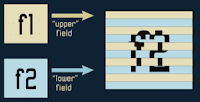 Trish & Chris Meyer are posting their library of tutorials on After Effects and video onto their ProVideo Coalition blogs: Creating Motion Graphics and CMG Keyframes. The latest ones debunk common misconceptions on field dominance, field rendering, and time code; others clarify luminance, float, aspect ratios, and more.
Trish & Chris Meyer are posting their library of tutorials on After Effects and video onto their ProVideo Coalition blogs: Creating Motion Graphics and CMG Keyframes. The latest ones debunk common misconceptions on field dominance, field rendering, and time code; others clarify luminance, float, aspect ratios, and more.Plus there's Favorite Technical References if you want extra geek.
They also have a video/DVD explaining all this quite effectively: VideoSyncrasies, The Motion Graphics Problem Solver.
February 19, 2008
Animated buttons using After Effects and Flash
Lee Brimelow has a new video tutorial at gotoAndLearn() on creating animated buttons using After Effects and Flash. There's a better quality version and download from that link above.
January 10, 2008
Smashing Photoshop tutorial roundups
 Something for the bored perhaps...Smashing Magazine has 2 roundups of Photoshop tutorials: Adobe Photoshop Tutorials - Best Of and Hand-Picked Photoshop Tutorials.
Something for the bored perhaps...Smashing Magazine has 2 roundups of Photoshop tutorials: Adobe Photoshop Tutorials - Best Of and Hand-Picked Photoshop Tutorials.
November 30, 2007
School, a SketchUp resource
 School is website that focuses on training and support for SketchUp users. Designers Mike Tadros & Alex Oliver are trying to make it a support center with DVDs, podcasts (iTunes and RSS), and forums for tips, tricks, tutorials, and answers to questions. Check it out if you get the chance: http://go-2-school.com.
School is website that focuses on training and support for SketchUp users. Designers Mike Tadros & Alex Oliver are trying to make it a support center with DVDs, podcasts (iTunes and RSS), and forums for tips, tricks, tutorials, and answers to questions. Check it out if you get the chance: http://go-2-school.com.
November 28, 2007
Teach Final Cut in a bikini (no experience required)
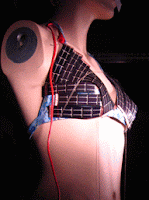 from Craigslist via Final Cut Pro-L, and don't forget the Solar Powered Bikini:
from Craigslist via Final Cut Pro-L, and don't forget the Solar Powered Bikini:"We need Beautiful, physically fit girls to be Instructors for the Popular Video Editing Software 'Final Cut Pro.'
NO EXPERIENCE REQUIRED!
We will teach you everything you need to know to teach this program to your students.
You must be comfortable wearing a bikini while you teach.
You will teach 2 to 3 students at a time, and there will always be an experienced editor on site for assistance.
You will be a legitimate instructor, teaching a legitimate skill to others, and you will be wearing a bikini, no nudity.
Please respond to this email with a head shot and a recent full body photo (it does not have to be in a bikini, but it has to be representative of your current physical condition)
- Location: Santa Monica
- Compensation: $20/hr
- Principals only. Recruiters, please don't contact this job poster.
- Please, no phone calls about this job!
- Please do not contact job poster about other services, products or commercial interests."
Date: 2007-11-28, 9:13AM PST
http://losangeles. craigslist. org/wst/tfr/ 492147519. html
.
October 29, 2007
Trapcode in FCP tutorial
 Red Giant Software and John Dickinson have a new Final Cut Pro motion graphics tutorial that uses Trapcode Shine, Starglow and 3D Stroke.
Red Giant Software and John Dickinson have a new Final Cut Pro motion graphics tutorial that uses Trapcode Shine, Starglow and 3D Stroke.You can find a quick rundown of the new-old Trapcode filters in the review I did a few months ago for SF Cutters. In short, though similar filters (or Replicators or Behaviors) can be found in AE and Final Cut Studio, Trapcode's Shine, Starglow, and 3D Stroke offer more control, unique features, and probably faster results than the alternatives. The Trapcode website has numerous additional tutorials and examples for the same filters using AE.
October 11, 2007
fxphd echo
 Both Flowseeker and General Specialist are trumpeting classes at fxphd.com. The price is really good -- $110 per course. Here's the highlights and more at the links:
Both Flowseeker and General Specialist are trumpeting classes at fxphd.com. The price is really good -- $110 per course. Here's the highlights and more at the links:• A new Production track which includes a course on the RED camera
• A DV Rebel course overseen by Stu Maschwitz
• New Training in such au courant apps as Nuke, Apple Color, Smoke and Z-Brush
• Stills Photography
• New and repeat classes covering Flame, Maya, PFTrack, Shake, Fusion, Toxik, Monet/Mokey/Motor and Photoshop (as well as Mark Christiansen's After Effects course)
Subscribe to:
Posts (Atom)

